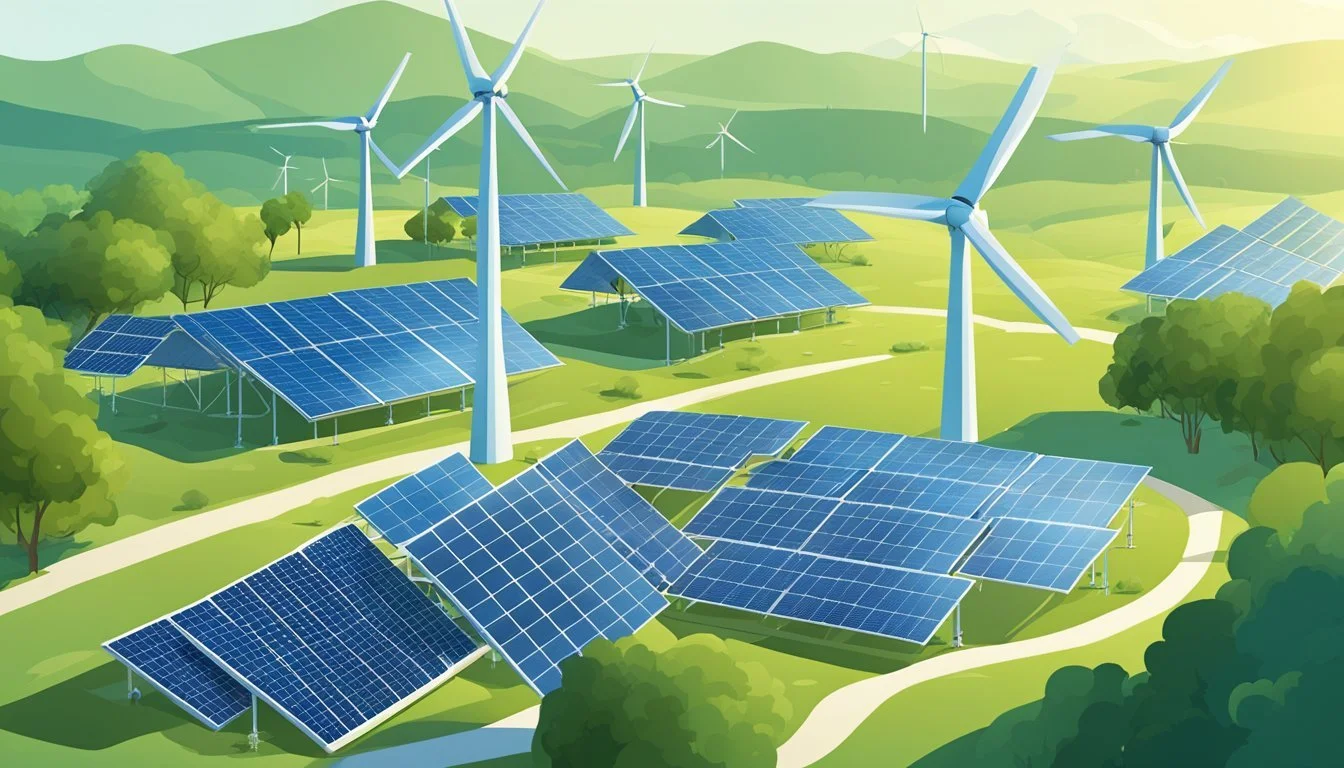Incentives for Renewable Energy and Conservation in Georgia
Navigating State Policies
Georgia is actively promoting the adoption of renewable energy and the importance of energy conservation through various incentive programs. Recognizing the environmental and economic benefits of a sustainable approach to energy, the state offers financial assistance and technical support aimed at enhancing energy efficiency and integrating renewable energy sources. The Georgia Environmental Finance Authority, for instance, plays a pivotal role in supporting such initiatives, providing valuable resources to residents and businesses alike.
To further incentivize the transition toward greener energy, Georgia offers specific programs that make it more appealing for homeowners and companies to invest in renewable energy systems. Examples include local incentives, rebates, and various financing options that lessen the financial burden of solar panel installations and energy-efficient upgrades. The benefits of these programs extend beyond immediate cost savings, encouraging long-term investment in renewable technologies and contributing to statewide efforts to reduce carbon emissions.
In addition to financial incentives, Georgia provides energy bill assistance and technical assistance programs for schools, promoting widespread community awareness and engagement in energy conservation. This holistic approach not only addresses the current demand for energy but also educates the younger generation on the responsible use of resources, laying the groundwork for a future where renewable energy and conservation are a collective priority.
Renewable Energy Initiatives in Georgia
Georgia takes a proactive stance in promoting the production and consumption of renewable energy, with various programs spearheaded by the Georgia Environmental Finance Authority (GEFA), significant strides in solar energy production, and the development of community solar opportunities that align with state energy goals.
Georgia Environmental Finance Authority Role
The Georgia Environmental Finance Authority plays a pivotal role in supporting various energy programs aimed at enhancing energy efficiency and the adoption of renewable resources across the state's industry, agriculture, and public facilities. Initiatives like Building Operator Certification exemplify GEFA's commitment to reducing energy consumption and promoting sustainable practices.
Solar Energy Advancements
In Georgia, solar energy is burgeoning, with the average cost for a 5-kilowatt solar installation falling between $13,500 and $12,733. These figures come before the application of a substantial 30% federal tax credit, making solar installations more affordable for homeowners and businesses. Solar incentives are an integral part of Georgia's energy strategy, contributing to a shift in the state's generation fleet toward cleaner, sustainable power sources.
Community Solar Opportunities
Community solar represents a growing segment of the renewable energy landscape in Georgia. It enables individuals and businesses to invest in solar energy collectively, even if they cannot install solar panels on their own properties. This shared approach not only democratizes access to green energy but also aligns with Georgia’s ambition to lower energy bills and meet the energy demands of an increasingly environmentally conscious population.
Energy Efficiency Programs
Georgia offers a variety of programs aimed at enhancing energy efficiency across multiple sectors. These initiatives are focused on reducing energy consumption, lowering costs, and promoting environmental sustainability.
Home Energy Efficiency Improvements
Residential properties in Georgia can take advantage of programs like the Energy Efficiency and Conservation Block Grant to make energy-saving upgrades. Homeowners may receive rebates and incentives for implementing improvements, such as high-efficiency appliances, HVAC systems, and better home insulation.
Weatherization Assistance Program
The Weatherization Assistance Program (WAP) supports low-income households in Georgia. WAP focuses on enhancing the energy efficiency of homes through measures like insulation, weather stripping, and repairing or replacing old heating and cooling systems, which can lead to significant energy savings.
Energy Savings for Local Governments
Local governments in Georgia are encouraged to increase energy efficiency in public facilities. The State Energy Program provides resources and assistance to local governments looking to reduce energy consumption and costs through efficient public infrastructure management and upgrades.
Financial Incentives for Energy Conservation
Georgia offers a suite of financial incentives for energy conservation for both residential and commercial properties, providing various ways for individuals and businesses to reduce their environmental footprint while also benefiting financially.
Federal and State Tax Credits
Federal tax credits are available for energy efficiency improvements to both existing homes and new construction. These incentives include deductions for solar energy systems, wind turbines, and geothermal heat pumps. On the state level, Georgia's tax incentives support individuals and businesses who invest in energy-efficient products and renewable technologies, aiding in the reduction of initial capital costs and promoting sustainable practices.
Rebates and Competitive Funding
Georgia residents and business owners can take advantage of rebates for implementing energy-efficient appliances and systems, as supplied by local utilities or through state programs. Moreover, entities making significant strides in energy conservation may be eligible for competitive funding opportunities, which offer additional financial incentives to support the adoption of renewable energy and efficiency measures.
Investment Support from Georgia Power
Georgia Power, the largest utility in the state, provides distinct investment support programs to help customers save energy and money. Initiatives such as the Home Energy Improvement Program offer rebates for a range of energy-efficient upgrades. For larger entities, Georgia Power's Custom Savings allows businesses to receive incentives for tailor-made energy-saving solutions that meet their specific needs.
Support and Training Programs
Georgia provides robust support and training programs through various initiatives that aim to enhance energy efficiency and promote renewable energy. These programs offer technical support and education, fostering job growth and equipping contractors and individuals with necessary skills and certifications.
State Energy Program Services
The State Energy Program (SEP) in Georgia supplies financial assistance alongside technical support to boost the state's energy efficiency and renewable energy initiatives. It aims at reducing energy costs and improving the environment, directly contributing to job creation within the state's green energy sector.
Contractor Training and Certification
To maintain high standards in the renewable energy field, Georgia ensures contractors receive proper training and certification. This framework prepares them for the industry, ensuring they are proficient in the latest energy-saving techniques and renewable energy technologies.
Educational Webinars and Workshops
Continuous education is fostered through educational webinars and workshops, which are integral parts of Georgia's strategy to inform and engage various stakeholders in renewable energy and sustainability efforts. These sessions provide insights into state and federal energy policies, new technologies, and best practices for energy conservation.
Energy Infrastructure Development
In Georgia, substantial investments are being made to modernize energy infrastructure, focusing on enhancing renewable energy integration and grid reliability. These developments are tailored to meet the state's growing energy needs with resilience and efficiency.
Battery Storage and Renewable Integration
Georgia is advancing its energy infrastructure by incorporating battery storage systems, which are critical for renewable energy integration. The State Energy Program supports initiatives that are instrumental in streamlining the integration of solar and wind energy into the state's power grid. This includes building operator certification programs that help manage the variability and intermittency of renewable energy sources.
Upgrading Transmission Lines
Upgrades to transmission lines are a key component of Georgia's strategy to improve its energy infrastructure. By investing in more robust and higher-capacity lines, the state prepares to handle increased energy loads and to distribute electricity generated from renewable sources more efficiently. The improvement of transmission lines aids in reducing transmission losses and supports the broader adoption of clean energy.
Enhancing Electric Grid Reliability
Georgia is also focused on enhancing electric grid reliability. A significant step towards this goal is the selection of Georgia for a $250 million grant for grid resiliency and clean energy. This grant will be used to implement projects aimed at bolstering grid resilience, thus ensuring that the state’s electric grid can withstand various stressors and continue to provide reliable service.
Policy and Regulatory Framework
Georgia's commitment to renewable energy and conservation is underscored by its evolving policy and regulatory framework. This framework establishes the guidelines and sets the direction for how the state handles power purchase agreements, the impact of natural gas policies, and delineates the influential role of the Public Service Commission.
Power Purchase Agreements Regulation
In Georgia, power purchase agreements (PPAs) offer a legal structure for entities to finance renewable energy projects. These agreements allow energy producers to sell electricity at predetermined rates for extended periods, ensuring financial stability and encouraging investment in renewables. PPAs are subject to regulation to protect consumer interests and to align with the state's energy goals.
Natural Gas Policy Impact
Natural gas policy in Georgia influences the broader energy market, including renewables. Decisions regarding the natural gas industry can have ripple effects on the feasibility and competitiveness of renewable energy sources. As the U.S. Department of Energy examines transitions to cleaner energy, Georgia's policies ensure that natural gas continues to provide a reliable baseline as the state increases its renewable energy portfolio.
Public Service Commission's Role
The Georgia Public Service Commission holds significant responsibility in shaping the state's energy landscape. Through its regulatory authority, the Commission promotes sustainable energy policies and practices, ensuring that the public service entities adhere to the state's conservation and efficiency standards. The Commission's decisions directly impact the adoption rates and the implementation success of renewable energies in Georgia.
Engaging with Stakeholders
Effective engagement with stakeholders is crucial in shaping and supporting incentives for renewable energy and conservation in Georgia. This engagement ensures that a diverse array of interests are considered in the development of sustainable energy policies and programs.
Joining the Mailing List for Updates
Individuals and organizations interested in staying informed about renewable energy incentives in Georgia are encouraged to join the Georgia Environmental Finance Authority's mailing list. By subscribing, they receive timely updates on policy changes, funding opportunities, and relevant events in the Southeast region.
Visit the GEFA website: Navigate to the official GEFA site to subscribe.
Provide contact information: Submit an email address to ensure receipt of the latest news and updates.
Public Feedback Mechanisms
The authority values public feedback as a vital component in the refinement of its renewable energy policies. There are multiple channels made available for stakeholders to express their perspectives:
Online surveys and comment forms: Easily accessible on the GEFA website.
Direct emails: Stakeholders can send their thoughts and suggestions directly to the concerned department within GEFA.
Stakeholder Meetings and Partnerships
Stakeholder meetings play a significant role in fostering collaborations and partnerships that are beneficial for Georgia’s energy conservation efforts. These include:
Monthly informational sessions: Where stakeholders can learn about current initiatives and provide input.
Workshops and roundtables: For more in-depth discussion and partnership development with industry experts and policymakers.
Through these formal interactions, stakeholders get the opportunity to directly influence renewable energy strategies and conservation measures in Georgia.









